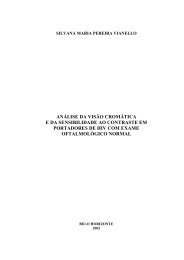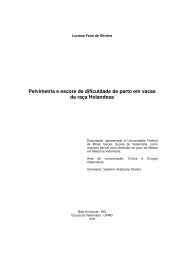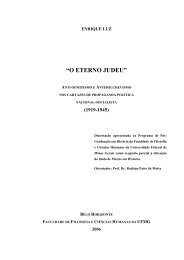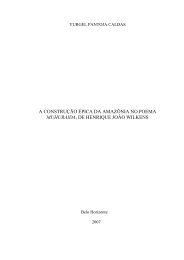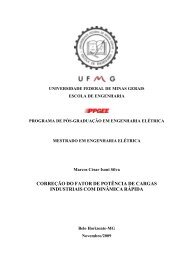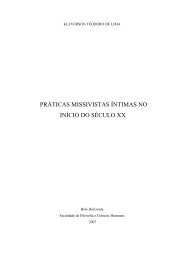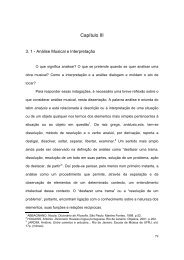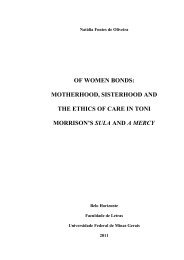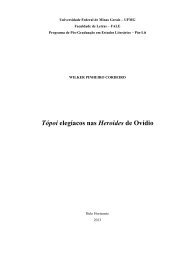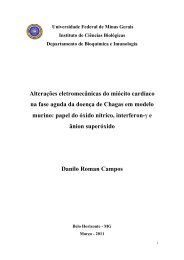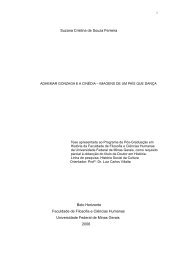Sobre o Estilo de Demétrio Um olhar crítico sobre a Literatura Grega ...
Sobre o Estilo de Demétrio Um olhar crítico sobre a Literatura Grega ...
Sobre o Estilo de Demétrio Um olhar crítico sobre a Literatura Grega ...
Create successful ePaper yourself
Turn your PDF publications into a flip-book with our unique Google optimized e-Paper software.
composição (su/nqesij) e o pensamento ou o assunto tratado (dia/noia/pra/gmata). 63<br />
Ainda, ao final <strong>de</strong> cada um <strong>de</strong>les, encontram-se os correspon<strong>de</strong>ntes falhos dos respectivos<br />
tipos <strong>de</strong> estilo, também analisados segundo os aspectos supracitados. Para o “grandioso”<br />
teríamos, então, o “frio”; para o “gracioso”, o “afetado”; para o “simples”, o “seco”; e, por<br />
fim, para o “estilo veemente”, o “sem graça”.<br />
termo e(rmhnei/a para <strong>de</strong>finir o estilo, conforme salienta o mesmo autor, po<strong>de</strong>ria estar justamente na<br />
ambiguida<strong>de</strong> <strong>de</strong> le/cij, que <strong>de</strong>signa tanto o estilo <strong>de</strong> um modo geral, quanto a escolha <strong>de</strong> palavras, o<br />
vocabulário ou mesmo uma fórmula (Démétrios.Du style, p. 162). Nesse sentido, as palavras <strong>de</strong> Schenkeveld<br />
corroboram as <strong>de</strong> Chiron: “A stumbling-block, which has been too often ignored, is the meaning of le/cij and<br />
e(rmhnnei/a. A common translation of both is style, but sometimes le/cij also means diction. The word<br />
<strong>de</strong>notes the choice of words (e)klogh_ tw~n o)noma/twn, <strong>de</strong>lectus verborum) and this is one of the<br />
elements of style which also inclu<strong>de</strong>s the arrangement or composition of the chosen words (su/nqesij,<br />
composition). The theories of types of style originated by the Greeks have been taken over by the Romans,<br />
who used the terms formae dicendi or genera dicendi. The Roman genera dicendi inclu<strong>de</strong> composition and<br />
diction, thus going back to the wi<strong>de</strong>st meaning of le/cij. On the other hand we often must accept the<br />
restricted sense of le/cij in the case of the Greek xarakth~rej le/cewj while giving the wi<strong>de</strong>r meaning to<br />
xarakth~rej th~j e(rmhnei/aj” (Schenkeveld, Studies in Demetrius on Style, p. 67.) Para uma compreensão<br />
dos termos que <strong>de</strong>finem o estilo, ver ainda Roberts, The Greek Words for 'Style.' (With Special Reference to<br />
Demetrius περὶ Ἑρμηνείας).<br />
63<br />
A or<strong>de</strong>m po<strong>de</strong> mudar conforme o capítulo. Grube atribui o fato a uma vonta<strong>de</strong> <strong>de</strong>liberada do autor na busca<br />
<strong>de</strong> uma maior varieda<strong>de</strong> (A Greek Critic: Demetrius On Style, p. 26-27 ), mas Chiron propõe ainda outra<br />
significação. Segundo ele, a or<strong>de</strong>m em que são apresentadas as três rubricas po<strong>de</strong>ria correspon<strong>de</strong>r a uma<br />
or<strong>de</strong>m <strong>de</strong> priorida<strong>de</strong> dos componentes, variável conforme o estilo; assim, o que caracterizaria o estilo<br />
grandioso seria em primeiro lugar, a composição, <strong>de</strong>pois, o pensamento e o vocabulário, enquanto que para o<br />
estilo elegante, seria primeiro o vocabulário e assim por diante (<strong>Um</strong> rhéteur méconnu: Démétrios, p. 39-40).<br />
24



